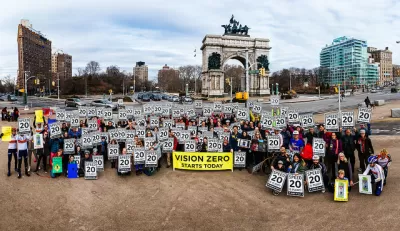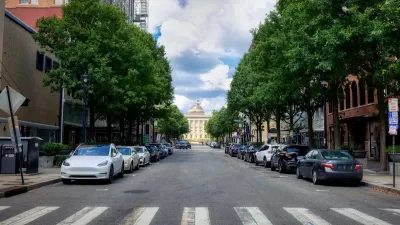Close to 50 governmental and nongovernmental organizations signed on to a pledge to take concrete action to reduce traffic deaths around the country.

A new federal initiative urges cities to take action toward the Department of Transportation (USDOT)’s National Roadway Safety Strategy, released last year. According to an article by Dan Zukowski in Smart Cities Dive, “Based on the safe system approach, the program’s five strategies focus on safer people, safer vehicles, safer speeds, safer roads and post-crash care.”
The initiative includes almost 50 government, industry, and nongovernmental participants that have pledged to take specific steps to reduce roadway deaths.
The commitments include:
- The National League of Cities will include up to 50 additional communities in its Safety First Challenge, along with adding local safety data resources, working with youth safety leaders and elected officials.
- The American Association of State Highway and Transportation Officials is updating its Highway Safety Manual with added research-based methods and more expansive pedestrian and bicyclist safety considerations.
- The League of American Bicyclists will provide technical assistance to local governments and work with states as they implement vulnerable road user safety, speed management and Complete Streets planning activities.
- The Vision Zero Network is developing a new series of resources and educational opportunities for local, regional and Tribal communities.
FULL STORY: US DOT launches roadway safety call to action

Planetizen Federal Action Tracker
A weekly monitor of how Trump’s orders and actions are impacting planners and planning in America.

Map: Where Senate Republicans Want to Sell Your Public Lands
For public land advocates, the Senate Republicans’ proposal to sell millions of acres of public land in the West is “the biggest fight of their careers.”

Restaurant Patios Were a Pandemic Win — Why Were They so Hard to Keep?
Social distancing requirements and changes in travel patterns prompted cities to pilot new uses for street and sidewalk space. Then it got complicated.

Platform Pilsner: Vancouver Transit Agency Releases... a Beer?
TransLink will receive a portion of every sale of the four-pack.

Toronto Weighs Cheaper Transit, Parking Hikes for Major Events
Special event rates would take effect during large festivals, sports games and concerts to ‘discourage driving, manage congestion and free up space for transit.”

Berlin to Consider Car-Free Zone Larger Than Manhattan
The area bound by the 22-mile Ringbahn would still allow 12 uses of a private automobile per year per person, and several other exemptions.
Urban Design for Planners 1: Software Tools
This six-course series explores essential urban design concepts using open source software and equips planners with the tools they need to participate fully in the urban design process.
Planning for Universal Design
Learn the tools for implementing Universal Design in planning regulations.
Heyer Gruel & Associates PA
JM Goldson LLC
Custer County Colorado
City of Camden Redevelopment Agency
City of Astoria
Transportation Research & Education Center (TREC) at Portland State University
Camden Redevelopment Agency
City of Claremont
Municipality of Princeton (NJ)





























